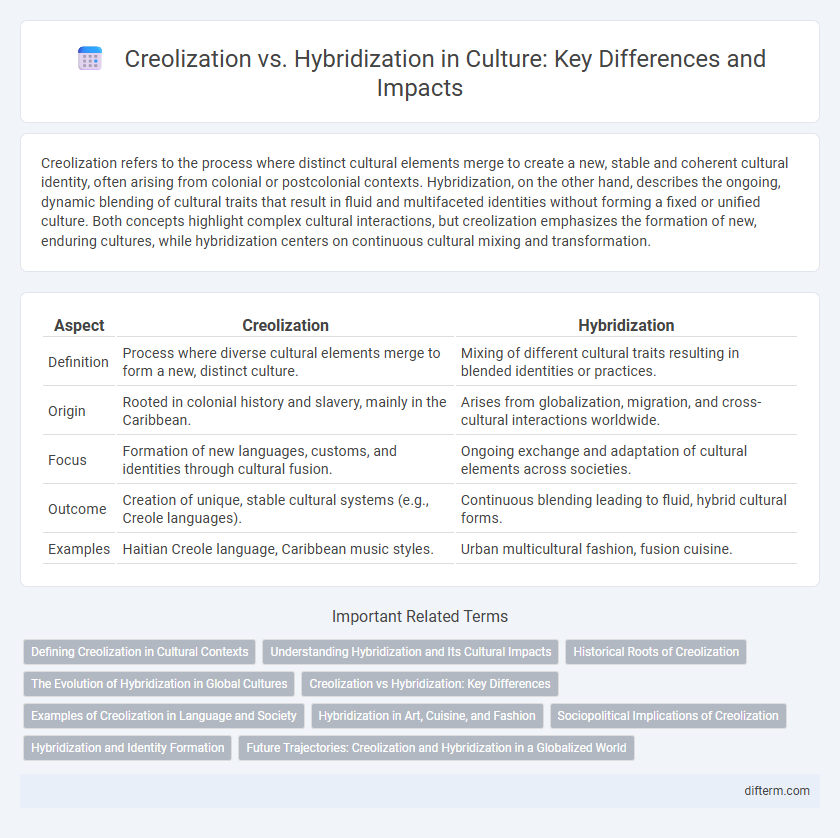Creolization refers to the process where distinct cultural elements merge to create a new, stable and coherent cultural identity, often arising from colonial or postcolonial contexts. Hybridization, on the other hand, describes the ongoing, dynamic blending of cultural traits that result in fluid and multifaceted identities without forming a fixed or unified culture. Both concepts highlight complex cultural interactions, but creolization emphasizes the formation of new, enduring cultures, while hybridization centers on continuous cultural mixing and transformation.
Table of Comparison
| Aspect | Creolization | Hybridization |
|---|---|---|
| Definition | Process where diverse cultural elements merge to form a new, distinct culture. | Mixing of different cultural traits resulting in blended identities or practices. |
| Origin | Rooted in colonial history and slavery, mainly in the Caribbean. | Arises from globalization, migration, and cross-cultural interactions worldwide. |
| Focus | Formation of new languages, customs, and identities through cultural fusion. | Ongoing exchange and adaptation of cultural elements across societies. |
| Outcome | Creation of unique, stable cultural systems (e.g., Creole languages). | Continuous blending leading to fluid, hybrid cultural forms. |
| Examples | Haitian Creole language, Caribbean music styles. | Urban multicultural fashion, fusion cuisine. |
Defining Creolization in Cultural Contexts
Creolization in cultural contexts refers to the dynamic process where different cultural elements merge to form new, distinct identities and practices, often arising from colonial encounters and diaspora experiences. This phenomenon involves the blending of languages, traditions, and social norms to create hybrid societies with unique cultural expressions. Unlike simple hybridization, creolization emphasizes the creation of novel cultural forms that are deeply rooted in historical struggles and community resilience.
Understanding Hybridization and Its Cultural Impacts
Hybridization in culture refers to the blending of diverse traditions, languages, and practices, resulting in new, dynamic cultural forms that transcend original boundaries. This process catalyzes innovation and cultural exchange, influencing art, music, cuisine, and identity in globalized societies. Understanding hybridization reveals how cultures adapt and evolve, fostering inclusivity while challenging purist notions of cultural authenticity.
Historical Roots of Creolization
Creolization traces its historical roots to the colonial era when diverse African, European, and Indigenous cultures converged through slavery and trade, leading to the emergence of new, distinct cultural expressions. Unlike hybridization, which emphasizes the blending of existing cultures, creolization highlights the creation of entirely new cultural identities forged in contexts of power imbalance and resistance. This process significantly shaped languages, music, cuisine, and social practices in regions such as the Caribbean and the Americas.
The Evolution of Hybridization in Global Cultures
The evolution of hybridization in global cultures reflects the dynamic blending of diverse cultural elements, resulting in new, multifaceted identities that transcend traditional boundaries. Unlike creolization, which often emerges from specific colonial and postcolonial contexts, hybridization encompasses a broader range of cultural interactions driven by globalization, migration, and digital communication. This ongoing process fosters innovation in language, art, and social practices, shaping contemporary multicultural societies worldwide.
Creolization vs Hybridization: Key Differences
Creolization refers to the process by which distinct cultural elements blend to form a new, cohesive culture with unique linguistic, social, and artistic traits rooted in colonial and postcolonial contexts. Hybridization involves the mixing of different cultural forms to create new, dynamic identities and practices, often emphasizing ongoing transformation and fluid boundaries. Key differences lie in creolization's focus on emergent cultural systems with historical depth, while hybridization highlights continuous cultural exchanges and adaptation across globalized societies.
Examples of Creolization in Language and Society
Creolization manifests prominently in language through creole languages such as Haitian Creole, which blends French, African, and indigenous linguistic elements, creating a unique, fully developed spoken language that emerged from colonial and enslaved populations. Society-wide examples include the cultural fusion in the Caribbean, where African, European, and Indigenous traditions intermix to form distinct musical styles, cuisine, and religious practices, exemplifying the process of creolization as a dynamic, locally-rooted cultural creation. These examples highlight creolization as a phenomenon resulting from historical multilingual contact zones leading to new, stable cultural and linguistic identities.
Hybridization in Art, Cuisine, and Fashion
Hybridization in art manifests through the fusion of diverse cultural motifs, techniques, and materials, resulting in innovative expressions that challenge traditional boundaries. In cuisine, hybridization blends flavors, ingredients, and cooking methods from multiple culinary traditions, creating novel dishes that reflect globalization and cultural exchange. Fashion embraces hybridization by combining textiles, patterns, and styles from different cultures, producing unique garments that symbolize interconnected identities and contemporary creativity.
Sociopolitical Implications of Creolization
Creolization emerges as a dynamic process where diverse cultural elements blend to form unique identities, often challenging existing power structures and colonial legacies. This sociopolitical phenomenon fosters resistance and solidarity among marginalized communities by transforming language, traditions, and social norms into tools of empowerment. By reshaping cultural narratives, creolization disrupts hegemonic discourses and promotes inclusive dialogues around identity and autonomy.
Hybridization and Identity Formation
Hybridization in culture refers to the dynamic process where diverse cultural elements merge to create new, distinct identities, challenging traditional notions of fixed cultural boundaries. This phenomenon influences identity formation by enabling individuals and communities to negotiate multiple cultural affiliations, resulting in fluid, multifaceted identities that reflect global interconnectedness. Unlike creolization, which often emerges from specific historical contexts of colonization, hybridization emphasizes ongoing cultural exchanges that reshape identity in contemporary multicultural societies.
Future Trajectories: Creolization and Hybridization in a Globalized World
Creolization and hybridization represent transformative cultural processes shaping identity formation and social interactions in a globalized world. Future trajectories indicate an increasing fusion of linguistic, artistic, and social elements that transcend traditional boundaries, fostering innovative cultural expressions and resilience. These evolving dynamics challenge static notions of culture, emphasizing fluidity and interconnectedness across diverse communities.
Creolization vs Hybridization Infographic

 difterm.com
difterm.com